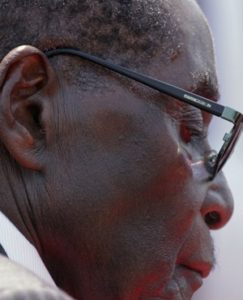Since the dramatic takeover by the military in Zimbabwe, it has become clear that a bloodless coup d’état will not remove him from power.
Led by the chief of the military and former Mugabe ally, General Constantino Chiwenga, the coup was clearly intended to place Mugabe under siege and then persuade him to resign in a comradely way. It has thus far only proved that the word ‘persuasion’ does not work well with the word ‘coup’.
It makes no sense to stage a military coup and then open negotiations to persuade the targeted leader to walk away. The normal flow of events of a military coup is that the targeted leader is forcefully removed and sometimes expelled from the country. The strange thing about the Zimbabwean coup is that the soldiers went halfway in, and then attempted to revert back to the political process and asked Mugabe to leave office.
Being the cunning leader that he is, Mugabe simply figured out that his comrades in the army lack the will to go all the way and remove him by force.
Firstly, there still might be a strong bond between him and the senior members of his party who turned against him. Hence, they will not fully humiliate Mugabe, the liberation hero by forcefully removing him from power.
Even more interesting, is that Mugabe’s detractors might be aware that the oldest head of state in the world is still popular enough that humiliating him in an open, forceful manner could backfire.
There is, however, a more sinister reason why the military only went halfway in attempting to remove Mugabe.
Had they gone ahead and announced that Mugabe is removed and succeeded by Emmerson Mnangagwa, for example, the military would have then had to deal with the consequences of a coup – even if that coup would have removed the controversial Mugabe.
When a coup is undertaken, it means that the political or constitutional process of addressing leadership change is interrupted. Therefore, whoever gets installed as a leader immediately after the coup, will serve as a transitional or caretaker leader pending elections.
When a coup is carried out, there ought to be elections as soon as possible. This is meant to refresh the political mandate to return to the normal political process.
The problem that the Zimbabwean military generals were faced with – which also made it difficult to summarily throw Mugabe out – is that they had no intention of refreshing the political mandate through free and open elections.
In this case, free and open elections would not guarantee them their continued hold on power. What if their candidate did not succeed? What if the elections were organised by an independent transition body overseen by the global community? Those are some of the uncertainties they would have taken into account in the manner they removed Mugabe.
To deal with this matter, the Zimbabwean military decided to suspend Mugabe’s government, and then reinstate it just for the purpose of him having to anoint a civilian leader, Mnangagwa.
But Mugabe wouldn’t have any of that. He is actually daring the military to go ahead and complete their coup against him or go back to their barracks and allow him to continue to manage the succession politically.
The military tried to use a coup to remove Mugabe, while doing it in a way that would ensure they do not incur the cost of staging a military takeover. This is why they were at pains to explain on national TV that what has happened is not a coup, but a mere correction.
Even if Mugabe has been removed as a party leader, it is clear to anyone that the political process that removed him from his party was presided upon by the military. In all this, the opposition party in Zimbabwe are mere spectators as state institutions are used to manage a succession process within Zanu-PF.
Mugabe, on the other hand, has taken a strong position that the military cannot have its cake and eat it.
His message is that you either follow the constitutional process through which to manage succession or you use a military coup; you cannot have it both ways.
– Ralph Mathekga is a Fellow at the SARChI Chair: African Diplomacy and Foreign Policy at the University of Johannesburg and author of When Zuma Goes.
Disclaimer: News24 encourages freedom of speech and the expression of diverse views. The views of columnists published on News24 are therefore their own and do not necessarily represent the views of News24.
Post published in: Featured



I’m afraid this half-backed coup will sink the country into chaos.
Mugabe and his wife both must go, Mnangagwa too, and Grace’s gang also.
Zimbabwe today has the opportunity of embrace democracy and rebuilt itself as a prosperous and free nation.
Best analysis yet.